| This year, Korea marks the 60th anniversary of diplomatic relations with 15 Latin American countries — Mexico, Argentina, Colombia, Chile, Ecuador, Guatemala, the Dominican Republic, Panama, Costa Rica, Paraguay, El Salvador, Honduras, Jamaica, Nicaragua and Haiti. In 1962, Korea began its path toward modernization through ties with just 27 countries, but in the same year, it forged formal relations with 15 of the 20 Latin American nations achieving independence at the time. Korea.net explores the direction of cooperation between Korea and its Latin American partners through interviews with ambassadors from the region. |
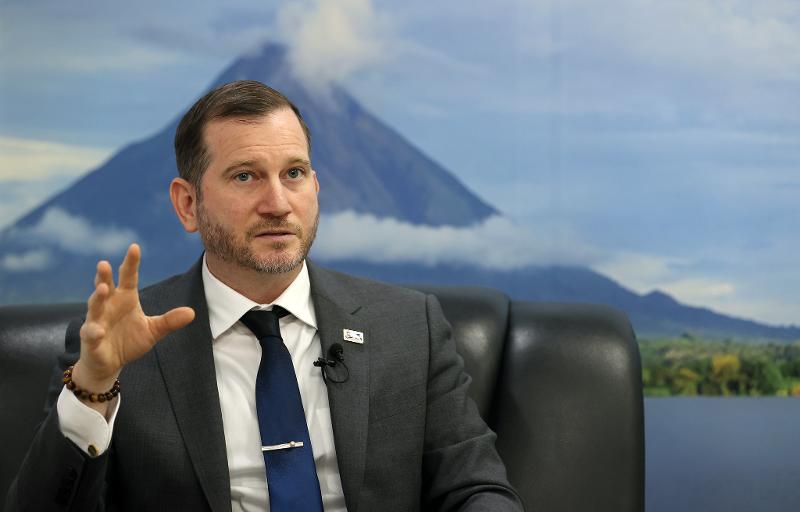
Nicaraguan Ambassador to Korea Rodrigo Coronel Kinloch on April 18 said boosting cultural understanding between Korea and Nicaragua will help bolster bilateral exchange and cooperation in an interview with Korea.net at his embassy in Seoul’s Jung-gu District.
By Yoon Sojung and Anais Faure
Photos = Jeon Han
Video = Kim Sunjoo and Lee Jun Young
Seoul | April 18, 2022
Nicaraguan Ambassador to Korea Rodrigo Coronel Kinloch uses public transportation in Seoul to commute instead of an official vehicle since assuming his post in December 2020.
Earlier this year, he even sent a letter of appreciation to Kakao Taxi, a Korean app for calling taxis, saying he has used the service more than 1,000 times.
Ambassador Coronel said he loves to wear Hanbok (traditional Korean clothing) and visit traditional markets to eat Korean food. He mentioned as his favorite meal makgeolli (milky rice wine) with bindaetteok (mung bean pancake) at Gwangjang Market in Seoul.
In an April 18 interview with Korea.net at his embassy in Seoul’s Jung-gu District, the diplomat discussed 60 years of bilateral relations and his life in Korea.
On bilateral ties, he said, “In moments of difficulty and suffering, friends are what you need the most.” He also thanks Korea for making Nicaragua a beneficiary of the COVAX Vaccines Advance Market Commitment, which Korea participates in, and KOPIA, an overseas agricultural technology development project of Korea’s Rural Development Administration.
A former business executive, Ambassador Coronel was previously ambassador to Japan from 2018-20. From 2014-16, he worked as brand external communication director of the fast-food chain KFC in the U.S. state of Kentucky, and from 2016-18, he was global brand director of Cafe Soluble in Nicaragua.
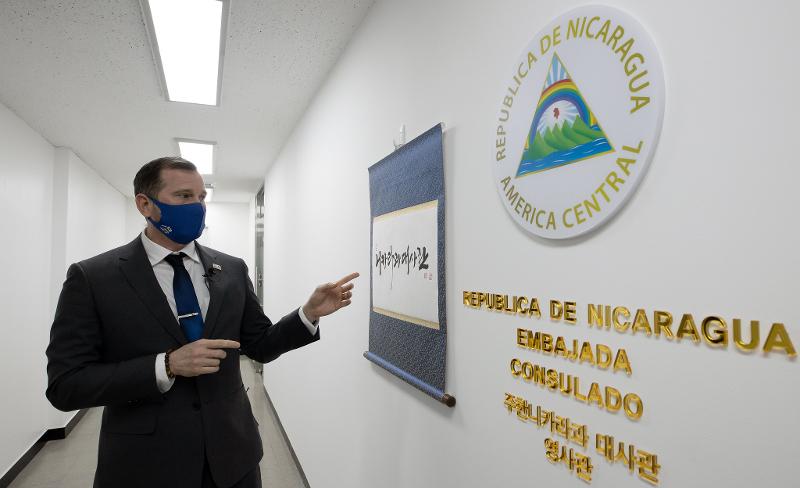
Nicaraguan Ambassador to Korea Rodrigo Coronel Kinloch shows the signboard of his embassy written in Hangeul on the main gate of the building in Seoul’s Jung-gu District.
– Korea and Nicaragua mark the 60th anniversary of diplomatic relationship this year. What was the most important task for boosting ties over the last 60 years in your view?
I would say the opening of the embassy in Seoul in 2014. My role as ambassador is to mark the (first) 60 years and work hard toward the development of bilateral relations for the next 60 years. The best is yet to come. We will see expanded bilateral cooperation in more diverse areas and more cultural and people-to-people exchanges.
– What event does the embassy recommend as a must-see for people to mark the diplomatic milestone?
As the Nicaraguan ambassador and an ambassador for introducing Korean culture to Nicaragua, I’ve tried to broker a marriage of culture between both countries. In this regard, we made a big Korean signboard hanging on the main gate of the embassy to boost cultural understanding and communication. The embassy has displayed more than 40 discoveries showing cultural similarities between both countries, and this keeps growing. To symbolize cultural exchange, I wish to create a wall painting with artists from both countries at the embassy.
We are working with the Multicultural Museum in Seoul’s Eunpyeong-gu District to introduce Nicaraguan culture such as wooden sculptures, pottery and traditional dresses. We will also co-host a fashion show the Korea Culture Association on Sept. 15, or Independence Day in Nicaragua, to showcase more than 60 traditional dresses of Nicaragua and Korea.
– How has bilateral cooperation in health and medicine progressed amid the COVID-19 pandemic?
In times of difficulty and suffering, friends are what you need the most. Korea has always been a good partner and a good friend, especially now with COVID-19. Nicaragua is a beneficiary of the COVAX vaccine supply initiative in which Korea participates. It’s very important to mention that you have to think beyond just vaccines and access to vaccines to the economic implications that COVID has had.
Korea has given a lot of help to Nicaragua thanks to the KOPIA overseas agricultural technology development project led by Korea’s Rural Development Administration. This project is important because it helps us boost agricultural efficiency and lower costs. So I’m very grateful to Korea not only for COVAX but also the KOPIA project.
– What progress has been seen in bilateral trade since Korea concluded a free trade agreement (FTA) with five Central American countries in 2018?
There is a saying in English that “The proof is in the pudding.” When it comes to the free trade pact, some people say you sign it and nothing happens. But the beautiful thing about the FTA that we did with Korea is that before signing it, trade volume was like USD 30 million and now it’s almost USD 110 million. This is almost a quadruple jump.
So (the FTA) truly has been a game changer. It also leads changes in production and distribution. A lot of companies from Korea are coming to Nicaragua through foreign direct investment, where they come and produce products in Nicaragua and then send them to other markets. Many Korean firms consider us as a Central American base and come to the tax-free zone of Nicaragua, where they import products and export them to other areas. So the FTA is a game changer and leads all changes.
– What sector does Nicaragua wish to expand cooperation in with Korea and why?
Our main export items include lobsters and grains. You can import them a lot easier and less costly thanks to the FTA. To do so, I will definitely say the No. 1 priority is this business association of importers and foreign direct investment. But most importantly, I would say that in my capacity, I want to expand the sector of culture exchange. This is because you have to know the person before you become a business partner and do business together. So if you know how many cultural similarities that Nicaragua and Korea share, you can trust us more and we can work together better.
– What cultural similarities have you found between both countries?
In food, for instance, we can find maybe 10 or more of exactly the same foods. It was very amazing. Sometimes people ask me to recommend a good place for Nicaraguan food or culture in Korea. Then I tell them to just go to any market in Korea and what you eat there will be something people in a market in Nicaragua will be eating.
Nicaraguans eat moronga, similar to sundae (pig intestine sausage) and carne desmenuzada, a dish very close to yukgaejang (spicy stew with shredded beef). At a Nicaraguan market, you can find the bamboo mat petate and the wooden fan abanico de madera. Nicaraguan children love to play juego de carnicas (marbles) and juego de Ias Estatuas (Red Light, Green Light). I will continue to make such discoveries and broaden cultural understanding.
– Please tell us about your life in this country.
Sometimes I put on Hanbok (traditional Korean clothes) and visit Namdaemun Market or other traditional markets to explore the delicacy and elegance of Korean culture. I walk to the embassy because the embassy office and residence are very close. The best food I had was makgeolli and bindaetteok at Gwangjang Market in March. The live octopus dish was an interesting experience. This was the first experience where I had to fight against my food but it was pretty delicious.
I am also very interested in Korean traditional alcoholic beverages. Recently I visited the Sool Gallery in Seoul’s Jongno-gu District, where I sampled a variety of makgeolli. From clean and light taste to rich flavor and deep aroma, I tasted many kinds of the booze. I found it very impressive and learned about the ingredients and history of each beverage and the brewers’ passion.
– You use public transportation instead of an official embassy vehicle. Have you experienced any inconvenience?
I am very interested in resolving the issue of climate change. I do not need an official vehicle because the embassy and the residence are all a 15-minute walk for me. Walking is better. When I have a meeting outside, I use subway or Kakao Taxi. I find Korean public transport very clean and efficient.
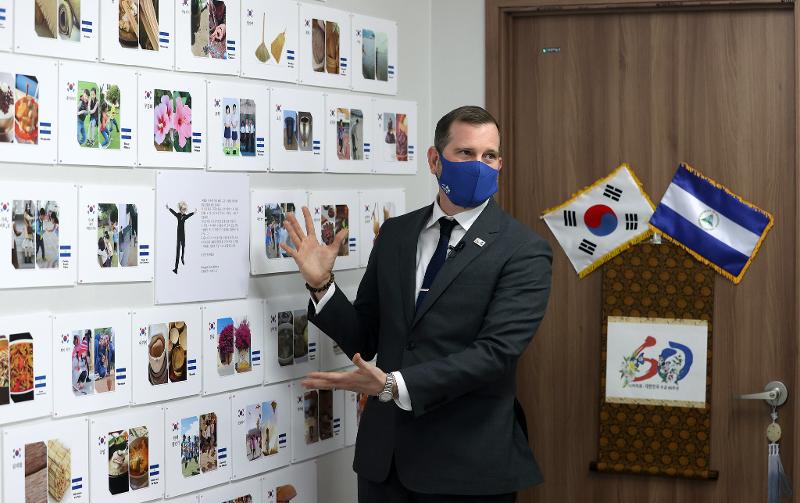
Nicaraguan Ambassador to Korea Rodrigo Coronel Kinloch introduces “Wall of Similarities” inside his embassy in Seoul’s Jung-gu District featuring commonalities between Korean and Nicaraguan culture.
arete@korea.kr


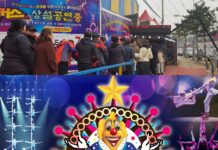
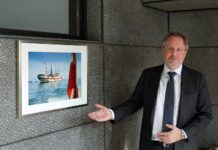



![[K-brand-promoting ethnic Koreans ⑤] Spreading taekwondo ‘spirit’ in Singapore](https://gangnam.com/file/2024/02/20231129124433000_ENU3D0FB-218x150.png)















